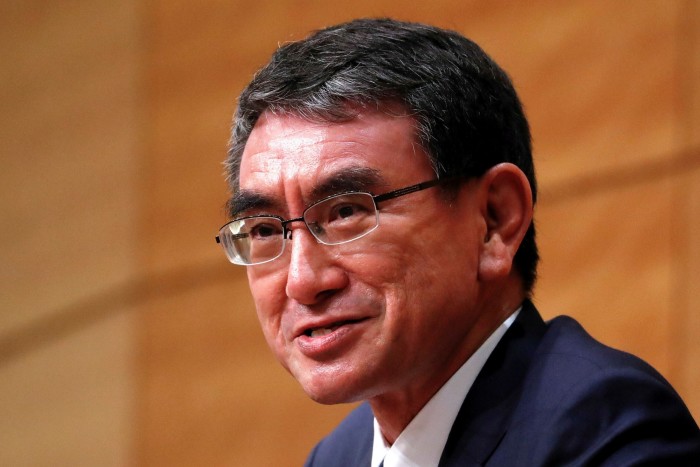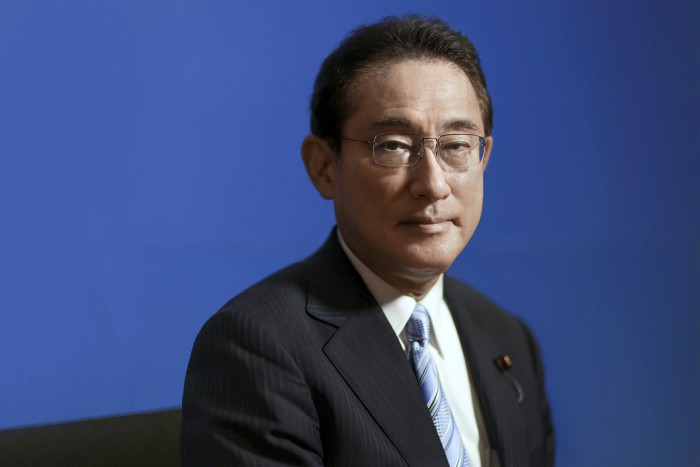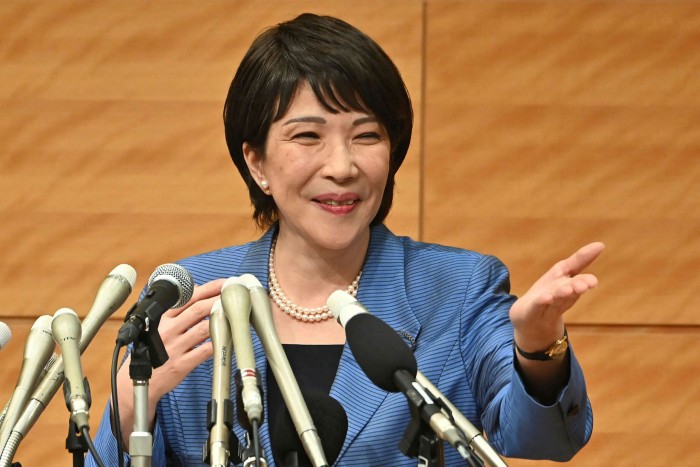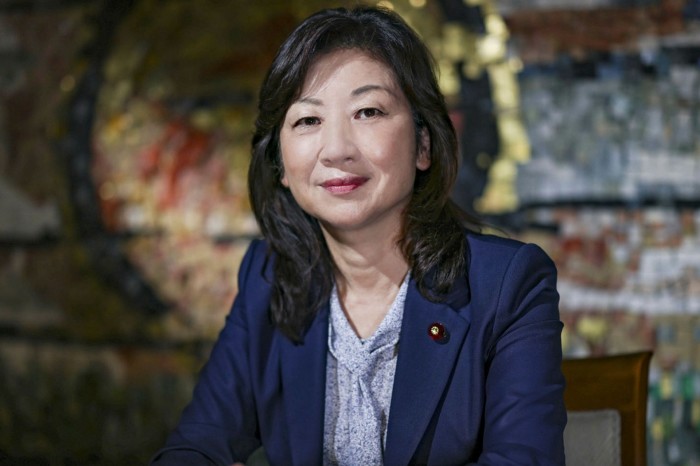The contest to replace Yoshihide Suga as Japan’s prime minister kicks off on Friday with a four-way battle between a US-educated champion of deregulation, a sceptic of neoliberal policies and two outspoken female politicians seeking to become the first woman to take the top job.
With the Covid-19 crisis leaving the ruling Liberal Democratic party facing its biggest threat since it lost power to the opposition in 2009, the leadership race is the most unpredictable contest of the past 15 years. It will also be the first with two female runners in a country where less than 10 per cent of parliamentarians are women.
Some of the LDP’s largest factions — policy groups that have historically exerted influence in leadership contests — have failed to unify their members to back a single candidate.
With the public increasingly frustrated by the government’s handling of the pandemic, a younger generation of politicians wants to break with tradition and cast their votes independently. They are desperate to find a candidate with popular appeal who can lead the party to victory in a general election that must be held by the end of November.
Suga announced his resignation this month after just a year in office. His successor faces the formidable task of rebuilding the economy and confronting a range of challenges from the pandemic to an assertive China and global warming.
The winner on September 29 is almost certain to become prime minister, since the ruling coalition controls a majority in parliament.
Taro Kono
Minister in charge of administrative reform and vaccine policy
Education: Georgetown University School of Foreign Service
Previous roles: Foreign and defence minister
Jobs outside politics: Joined Fuji Xerox after university and helped set up its Singapore operation
Policy and personality: Son of Yohei Kono, former chief cabinet secretary who issued landmark 1993 apology to wartime “comfort women”. Not afraid to speak his mind, he has opposed government nuclear push and questioned closed immigration policy

If the head of the LDP were chosen by popular vote, the 58-year-old vaccines minister would be the clear favourite. Younger politicians led by Shinjiro Koizumi, another rising star and environment minister, have turned to Kono to reinvigorate Japan’s moribund political scene, which has been dominated by party heavyweights in their 80s.
Known for his direct, no-nonsense style and short temper, the former foreign and defence minister has said he is keen to take on vested interests to drive growth through digitalisation and overhaul Japan’s energy policy to achieve net zero carbon emissions by 2050.
Kono, who speaks English and is social media savvy, received the blessing of Taro Aso, the finance minister who heads the 53-member faction to which Kono belongs, to join the contest. But it remains unclear how many votes he can win from his colleagues.
Though widely perceived to be a maverick, Kono is from a politically well-connected family. His grandfather was deputy prime minister and his father the chief cabinet secretary who issued a landmark 1993 apology to wartime “comfort women”, South Korean women forced into sex slavery during Japan’s colonial rule.
Fumio Kishida
Head of LDP’s 47-member Kochikai faction
Education: Waseda University
Previous roles: Foreign and defence minister
Jobs outside politics: Formerly with Long-Term Credit Bank of Japan, now Shinsei Bank
Policy and personality: As Shinzo Abe’s foreign minister, he tried to deepen ties with Russian counterpart Sergei Lavrov over Japanese sake and vodka. Negotiated deal to settle “comfort women” issue, but the 2015 agreement with South Korea subsequently fell apart

With a solid record as a former foreign and defence minister, many LDP parliamentarians consider Kishida a safe and predictable choice to succeed Suga despite his low profile among the general public. Since becoming the first to declare his candidacy, the 64-year-old has given a detailed outline of his policy plans on Covid-19, diplomacy and economy.
His most striking statement was a pledge to move away from the neoliberal approach of deregulation and structural reforms taken by former prime ministers Junichiro Koizumi and Shinzo Abe since the early 2000s. Echoing the debate in the US and the UK, Kishida has promised to reduce an income gap that has widened in the wake of the pandemic.
While he has made commitments to coronavirus-related stimulus packages and aggressive monetary policy to beat deflation, Kishida and his 47-member faction have also pushed for fiscal discipline. He poses a formidable challenge to Kono, particularly since the LDP’s biggest faction, which is associated with Abe, has urged its members to vote for either Kishida or Sanae Takaichi, the third candidate.
Sanae Takaichi
Adviser to LDP’s women’s affairs division
Education: Kobe University
Previous roles: Internal affairs and communications minister
Jobs outside politics: Television presenter
Policy and personality: She is known as an admirer of Margaret Thatcher, but the early days of her political career were controversial for her endorsement of a 1994 book praising Adolf Hitler’s electoral tactics.

A win for one of the most prominent female politicians in Tokyo would be controversial both within and outside Japan because of Takaichi’s outspoken views on national security, constitutional reform and her frequent visits to the contentious Yasukuni war shrine, which honours Japan’s war dead including some convicted of war crimes.
Most of the contenders have pointed to the need for Japan to increase its defence spending and deepen regional ties to counter the threat from China. But Takaichi, a former communications minister, has been the most aggressive in seeking to strengthen Japan’s military capability.
She has pledged to carry on the Abenomics programme of aggressive monetary and fiscal stimulus with greater investments in crisis management.
She has also suggested shelving Japan’s goal of returning to a primary balance surplus by 2025 to prioritise hitting the inflation target of 2 per cent.
But victory for Takaichi is unlikely. Despite powerful backing from Abe, she does not belong to any faction. Many LDP parliamentarians also worry that her conservative views on gender roles would hurt the party’s chances in a general election.
Seiko Noda
LDP’s executive acting secretary-general
Education: Sophia University
Previous roles: Minister for internal affairs and communications, gender equality
Jobs outside politics: Joined Imperial Hotel after university
Policy and personality: An advocate of female empowerment, she gave birth at the age of 50 to a baby boy conceived through in vitro fertilisation using eggs from an American donor.

The former minister of gender equality made a last-minute run for the premiership after scrambling until the final hours to garner enough backing to join the race.
While she has yet to present her economic and foreign policies, the 61-year-old has pledged to create a country that is more diverse and friendly to the weak. In the late 1990s she became the youngest minister in the postwar era when she was appointed head of posts and telecommunications at the age of 37.
While she has long aspired to become the nation’s first female leader, she has a chequered history and was briefly ousted from the LDP after opposing former prime minister Koizumi’s postal reforms in 2005.
Her chances of winning the contest are slim since her political base is weak and she does not belong to a faction. But her entry is expected to bring further volatility to the race and divide critical votes.

